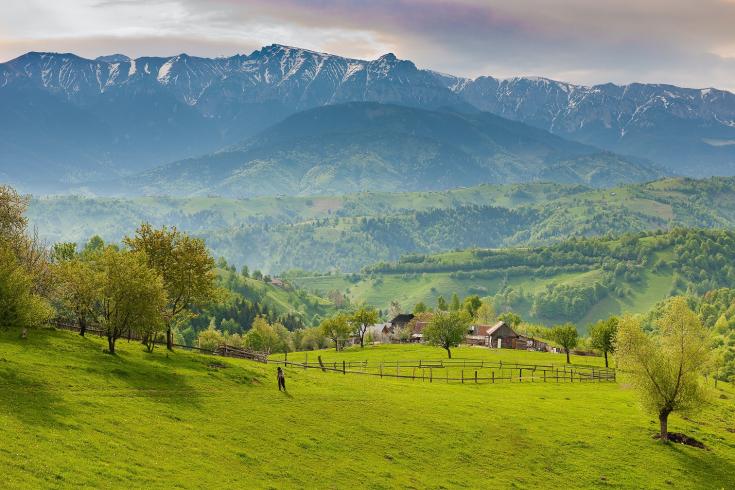Event
Practical Experiences-Payment for Ecosystem Services
25 May 2021
10 : 00 - 13 : 30 CEST
In person
|
Craiova,
Romania

PROGRESS International Training Workshop 3: Innovative financial and marketing mechanisms for payment for ecosystem services.
AN EU GREEN WEEK 2021 EVENT
Program agenda in Central European Time (CET) - (Subject to changes)
10:00 Presentation: Dragoș Ștefănescu (University of Craiova)
10:10 Welcome talk: Dan Selișteanu (University of Craiova, vice-rector)
10:20 About Interreg Europe PROGRESS: Besnik Mehmeti (PROGRESS coordinator, ANCI-Toscana, Italy)
Moderator of the 3 Panels: Cătălin Barbu (University of Craiova)
10:25 Theme Panel 1: Valuing the positive impact of forestry in the provision of ES
Payments for Ecosystem Services (PES) can be considered as different financing arrangements for activities related to the conservation and sustainable use of natural ecosystems such as forests. PES schemes for forest ecosystems are linked in principally to carbon, water, or biodiversity.
1) Sincere - Forests for water in Catalonia - Teresa Baiges (Catalan Forest Ownership Centre)
2) Community supported afforestation - Zoltán Gayer (MyForest, Hungary)
3) Payment for Ecosystem Services in high-ecological-value and mature forests managed to free natural evolution - Stefan Esser (Sèlvans Association, Catalonia)
10:55 Debate
11:20 Theme Panel 2: Managing farmland areas to support ES
Farmers constitute the largest group of natural resource managers on Earth. They both depend on and generate a wide array of ecosystem services. Their actions can enhance and degrade ecosystems. Payments for farmers to enhance biodiversity or to develop a community supported bussiness model in agricultural field are effective ways to protect nature in an integrative way.
1) MyFarm Harta: Community supported agricultural business model in Hungary - Gergő Kövesdi (MyFarm Harta, Hungary)
2) Rural Development Program of Tuscany 2014-2020 - Sub-measure 10.1: "Payments for agro-climatic-environmental commitments" – Besnik Mehmeti (ANCI Toscana)
3) Calculation of the effectiveness of greenhouse gas and ammonia reduction measures in farms - Janis Zvirgzdins (Riga Technical University, Latvia)
4) Protecting Farmland Pollinators - Dr. Úna Fitzpatrick (National Biodiversity Data Centre NBDC, Ireland)
12:00 Debate
12:30 Theme Panel 3: Integrating the value of ecosystem services into national accounting and reporting systems
Natural capital is the most fundamental of the forms of capital since it provides the basic conditions for human existence, delivering food, clean water and air, and essential resources. There is growing interest in the use of accounting frameworks to understand the value of the natural environment. These have the potential to inform planning, management and investment decisions that minimise risks and maximise opportunities for public and private benefit.
1) Natural Capital Ireland Framework - Natural Capital Ireland (NCI) – Iseult Sheehy (Executive Coordinator, Natural Capital Ireland).
2) LIFE+ MAKING GOOD NATURA Project. A best practice for the development of governance models of the Natura 2000 Network - Massimo Rovai (University of Pisa, Italy)
3) Assessing the financial needs of biodiversity in Ireland and filling the funding gap - Dr. Shane McGuinness (University College Dublin, Landscape Finance Lab and Community Wetlands Forum, Ireland).
13:00 Debate
13:20 Conclusions
13:30 End of meeting
AN EU GREEN WEEK 2021 EVENT
Program agenda in Central European Time (CET) - (Subject to changes)
10:00 Presentation: Dragoș Ștefănescu (University of Craiova)
10:10 Welcome talk: Dan Selișteanu (University of Craiova, vice-rector)
10:20 About Interreg Europe PROGRESS: Besnik Mehmeti (PROGRESS coordinator, ANCI-Toscana, Italy)
Moderator of the 3 Panels: Cătălin Barbu (University of Craiova)
10:25 Theme Panel 1: Valuing the positive impact of forestry in the provision of ES
Payments for Ecosystem Services (PES) can be considered as different financing arrangements for activities related to the conservation and sustainable use of natural ecosystems such as forests. PES schemes for forest ecosystems are linked in principally to carbon, water, or biodiversity.
1) Sincere - Forests for water in Catalonia - Teresa Baiges (Catalan Forest Ownership Centre)
2) Community supported afforestation - Zoltán Gayer (MyForest, Hungary)
3) Payment for Ecosystem Services in high-ecological-value and mature forests managed to free natural evolution - Stefan Esser (Sèlvans Association, Catalonia)
10:55 Debate
11:20 Theme Panel 2: Managing farmland areas to support ES
Farmers constitute the largest group of natural resource managers on Earth. They both depend on and generate a wide array of ecosystem services. Their actions can enhance and degrade ecosystems. Payments for farmers to enhance biodiversity or to develop a community supported bussiness model in agricultural field are effective ways to protect nature in an integrative way.
1) MyFarm Harta: Community supported agricultural business model in Hungary - Gergő Kövesdi (MyFarm Harta, Hungary)
2) Rural Development Program of Tuscany 2014-2020 - Sub-measure 10.1: "Payments for agro-climatic-environmental commitments" – Besnik Mehmeti (ANCI Toscana)
3) Calculation of the effectiveness of greenhouse gas and ammonia reduction measures in farms - Janis Zvirgzdins (Riga Technical University, Latvia)
4) Protecting Farmland Pollinators - Dr. Úna Fitzpatrick (National Biodiversity Data Centre NBDC, Ireland)
12:00 Debate
12:30 Theme Panel 3: Integrating the value of ecosystem services into national accounting and reporting systems
Natural capital is the most fundamental of the forms of capital since it provides the basic conditions for human existence, delivering food, clean water and air, and essential resources. There is growing interest in the use of accounting frameworks to understand the value of the natural environment. These have the potential to inform planning, management and investment decisions that minimise risks and maximise opportunities for public and private benefit.
1) Natural Capital Ireland Framework - Natural Capital Ireland (NCI) – Iseult Sheehy (Executive Coordinator, Natural Capital Ireland).
2) LIFE+ MAKING GOOD NATURA Project. A best practice for the development of governance models of the Natura 2000 Network - Massimo Rovai (University of Pisa, Italy)
3) Assessing the financial needs of biodiversity in Ireland and filling the funding gap - Dr. Shane McGuinness (University College Dublin, Landscape Finance Lab and Community Wetlands Forum, Ireland).
13:00 Debate
13:20 Conclusions
13:30 End of meeting
Location